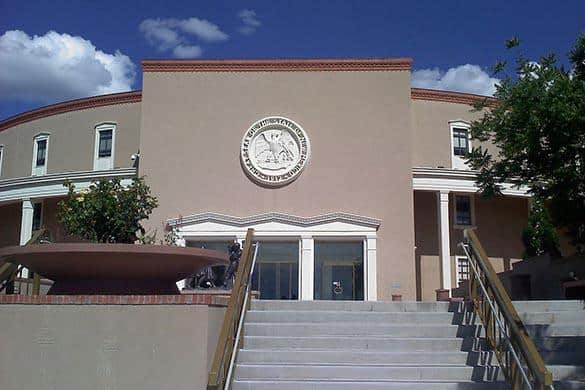 The Roundhouse in Santa Fe. Courtesy/SFNM
The Roundhouse in Santa Fe. Courtesy/SFNMBy ANDREW OXFORD
Election season might seem like the perfect time for a government ethics watchdog to be on high alert.
But in setting up a new statewide ethics commission, lawmakers are proposing to curtail its work during the height of election years — or even for the entirety of the campaign season.
Some legislators contend the commission needs a sort of blackout period to avoid political adversaries from filing complaints solely for the purpose of derailing a candidate’s campaign.
Advocates have been hesitant to give too much ground on the issue, though, for fear of defanging the proposed panel.
Three out of four New Mexico voters in the last election backed a constitutional amendment creating a statewide ethics commission. Now, lawmakers are mulling two dueling pieces of legislation setting out how the commission would operate.
The state House of Representatives passed one of those proposals Sunday evening, sending House Bill 4 to the Senate with a vote of 56-11.
That bill includes a provision barring the proposed commission from adjudicating a complaint against a candidate within 60 days of a primary election or general election. That would not apply to complaints involving the state’s campaign finance law or the Voter Action Act. And the commission would still be free to continue with investigations. But backers argue the provision would prevent the commission from becoming a weapon during campaign season.
“The investigation just stalls for that period of time,” said Rep. Daymon Ely, D-Corrales, who is sponsoring the bill.
Ely said he originally preferred a 30-day “blackout period.”
There is no such limit under current law for filing complaints with the Secretary of State’s Office about violations of campaign finance laws.
“What we’re trying to do is work a balance,” Ely said.
Rep. Rod Montoya, R-Farmington, proposed extending the so-called blackout period to 60 days before early voting begins.
“An election really begins — people start deciding on a race — 30 days prior, when early voting begins,” he said. “Anyone who would be motivated to just undermine a candidate’s ability to run without distraction would not use this as an opportunity just to get in a late ethics complaint.”
Looming over the debate were a lobbyist’s allegations of sexual harassment against state Rep. Carl Trujillo, a Democrat from the Santa Fe area, in the weeks leading up to his defeat in last year’s primary election.
A legislative committee later dismissed the case, and Trujillo is now suing the lobbyist, Laura Bonar, and several other associates alleging defamation.
“What we saw there was a complaint that was drug out through the entire election process beginning just prior to early voting,” Montoya said.
Bonar did not file a complaint when she first lodged her allegations but instead circulated an open letter to news organizations.
Still, Montoya’s argument underscored a point lawmakers have repeatedly raised in debating the proposed ethics commission: that politicians might actually face political attacks.
The House voted down Montoya’s proposal, but the issue is likely to come up again as the bill heads to the state Senate.
A separate bill would effectively bar the committee from acting on complaints at all for most of an election year.
Sponsored by Sen. Linda Lopez, D-Albuquerque, Senate Bill 619 would extend a blackout period on complaints against candidates from the day candidates must file to run in a primary election until the end of the general election. Her bill would prohibit the commission from taking any action on a complaint during that time and it does not provide exceptions for campaign finance laws.
The commission also would not be allowed to investigate “allegations of misconduct involving campaign advertisements.”
Senate Bill 619 has come under scrutiny for other reasons, too.
The bill would keep cases secret until the commission determines there has been an ethics violation, unless the person subject to a complaint waives confidentiality. Anyone who files a complaint would have to sign a confidentiality agreement. Violating that agreement would carry fines and jail time that would be tougher than the penalties for actually violating many of the state’s ethics laws.
Lopez said over the weekend that she may change her bill as other lawmakers offer input, describing the proposed legislation as very much a work in progress.
Asked if she would sign a bill with the sort of secrecy provisions currently in Lopez’s legislation, Gov. Michelle Lujan Grisham said Saturday that “transparency is a key part of the debate.”
“We do much better creating the kind of behavior and living by the standards we expect to see from our elected officials if you have more transparency than not,” she told reporters.
But the governor also argued there must be some measure of protection for people filing complaints.
“You have to have transparency. You have to. But you have to create a safe environment for the individuals who are complaining,” Lujan Grisham said.
The governor’s comments seemed to jibe with Ely’s bill, which would make ethics complaints public from the time the commission’s general counsel decides there is probable cause to pursue a case. He has argued that making ethics complaints public from the beginning of the process could deter some people from stepping forward with concerns about unethical behavior.
But other lawmakers have mostly raised concerns about the repercussions for politicians accused of wrongdoing instead of the prospect of retaliation against people filing complaints.
“Transparency is intended to create safeguards for all of us. I need to make sure it creates safeguards including for the person who is filing the complaint,” Lujan Grisham said.

